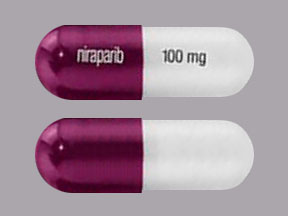Niraparib
Generic name: niraparib [ nih-RAP-a-rib ]
Brand name: Zejula
Dosage form: oral tablet (100 mg; 200 mg; 300 mg)
Drug class: PARP inhibitors
What is niraparib?
Niraparib is used as a "maintenance" treatment in adults to keep certain types of cancer from coming back. This includes cancers of the ovary, fallopian tube, or peritoneum (the membrane that lines the inside of your abdomen and covers some of your internal organs).
Niraparib is given after you have received chemotherapy (with cisplatin, oxaliplatin, carboplatin, or other similar products) and your cancer has responded to that medicine.
Niraparib is sometimes used only if your cancer has a specific genetic marker (an abnormal "BRCA" gene) or other gene mutations. Your doctor will make sure you have the correct tumor type to be treated with niraparib.
Niraparib may also be used for purposes not listed in this medication guide.
Niraparib side effects
Get emergency medical help if you have signs of an allergic reaction: hives; difficult breathing; swelling of your face, lips, tongue, or throat.
Stop taking niraparib and call your doctor at once if you have signs of a bone marrow disorder: fever, frequent infections, weakness, tiredness, feeling short of breath, weight loss, blood in your urine or stools, easy bruising or bleeding.
Niraparib may cause serious side effects. Call your doctor at once if you have:
-
pounding heartbeats or fluttering in your chest;
-
sores or white patches in or around your mouth, trouble swallowing or talking, dry mouth, bad breath, altered sense of taste;
-
pain or burning when you urinate; or
-
headache, vision changes, confusion, seizure with our without pounding in your neck or ears.
Your cancer treatments may be delayed or permanently discontinued if you have certain side effects.
Common side effects of niraparib may include:
-
stomach pain, loss of appetite, nausea, vomiting;
-
abnormal blood tests;
-
little or no urination, changes in the color of your urine, painful urination;
-
back or muscle pain;
-
headache, dizziness;
-
sleep problems (insomnia);
-
tiredness;
-
cough, shortness of breath; or
-
rash.
This is not a complete list of side effects and others may occur. Call your doctor for medical advice about side effects. You may report side effects to FDA at 1-800-FDA-1088.
Warnings
Stop taking this medicine and call your doctor at once if you have fever, frequent infections, weakness, tiredness, shortness of breath, weight loss, blood in your urine or stools, easy bruising or bleeding. These may be symptoms of bone marrow disorder and may lead to death.
Before taking this medicine
Tell your doctor if you have or have ever had:
-
an allergy or sensitivity to aspirin or tartrazine (food dye);
You may need to have a negative pregnancy test before starting this treatment.
May harm an unborn baby. Do not use if you are pregnant. Use effective birth control while using niraparib and for at least 6 months after your last dose. Tell your doctor if you become pregnant.
It may be harder for you to get a woman pregnant while you are using niraparib.
Do not breastfeed while using this medicine, and for at least 1 month after your last dose.
How should I take niraparib?
Follow all directions on your prescription label and read all medication guides or instruction sheets. Use the medicine exactly as directed.
You may take niraparib with or without food, but take it at the same time each day.
Take this medicine at bedtime if it upsets your stomach.
Swallow the tablet or capsule whole and do not crush, chew, break, or open it.
If you vomit shortly after taking niraparib, do not take another dose. Take your next dose as scheduled.
You may need frequent medical tests and your cancer treatments may be delayed based on the results.
Your blood pressure and heart rate will need to be checked often.
Store this medicine in the original container at room temperature away from moisture and heat.
What happens if I miss a dose?
Skip the missed dose and use your next dose at the regular time. Do not use two doses at one time.
What happens if I overdose?
Seek emergency medical attention or call the Poison Help line at 1-800-222-1222.
What should I avoid while taking niraparib?
Follow your doctor's instructions about any restrictions on food, beverages, or activity.
What other drugs will affect niraparib?
Other drugs may affect niraparib, including prescription and over-the-counter medicines, vitamins, and herbal products. Tell your doctor about all other medicines you use.
More about niraparib
- Check interactions
- Compare alternatives
- Reviews (60)
- Side effects
- Dosage information
- During pregnancy
- Drug class: PARP inhibitors
- Breastfeeding
- En español
Patient resources
Other brands
Professional resources
Other brands
Related treatment guides
Further information
Remember, keep this and all other medicines out of the reach of children, never share your medicines with others, and use this medication only for the indication prescribed.
Always consult your healthcare provider to ensure the information displayed on this page applies to your personal circumstances.
Copyright 1996-2024 Cerner Multum, Inc. Version: 5.01.

